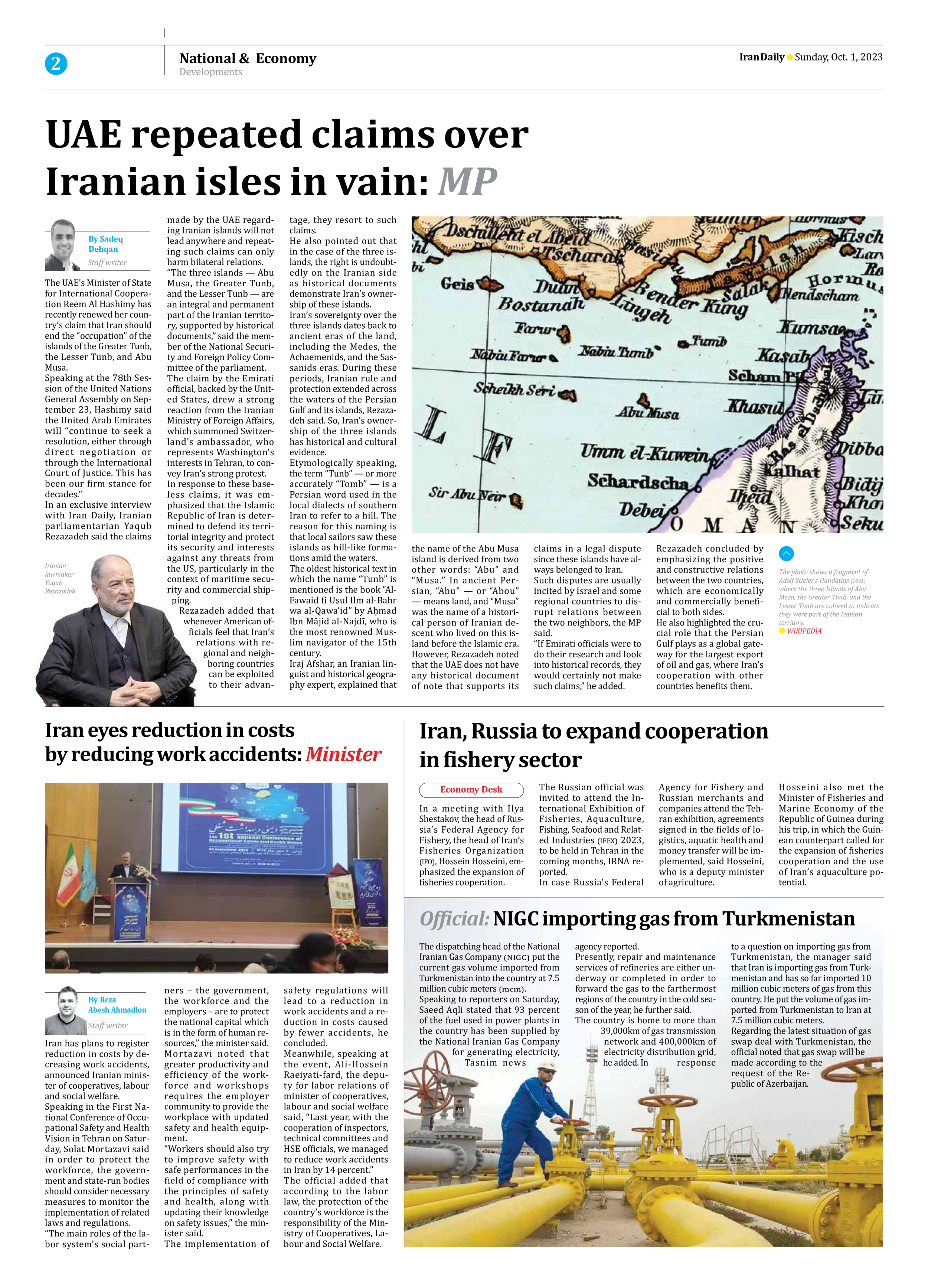
UAE repeated claims over Iranian isles in vain: MP
By Sadeq Dehqan
Staff writer
The UAE’s Minister of State for International Cooperation Reem Al Hashimy has recently renewed her country’s claim that Iran should end the “occupation” of the islands of the Greater Tunb, the Lesser Tunb, and Abu Musa.
Speaking at the 78th Session of the United Nations General Assembly on September 23, Hashimy said the United Arab Emirates will “continue to seek a resolution, either through direct negotiation or through the International Court of Justice. This has been our firm stance for decades.”
In an exclusive interview with Iran Daily, Iranian parliamentarian Yaqub Rezazadeh said the claims made by the UAE regarding Iranian islands will not lead anywhere and repeating such claims can only harm bilateral relations.
“The three islands — Abu Musa, the Greater Tunb, and the Lesser Tunb — are an integral and permanent part of the Iranian territory, supported by historical documents,” said the member of the National Security and Foreign Policy Committee of the parliament.
The claim by the Emirati official, backed by the United States, drew a strong reaction from the Iranian Ministry of Foreign Affairs, which summoned Switzerland’s ambassador, who represents Washington’s interests in Tehran, to convey Iran’s strong protest.
In response to these baseless claims, it was emphasized that the Islamic Republic of Iran is determined to defend its territorial integrity and protect its security and interests against any threats from the US, particularly in the context of maritime security and commercial shipping.
Rezazadeh added that whenever American officials feel that Iran’s relations with regional and neighboring countries can be exploited to their advantage, they resort to such claims.
He also pointed out that in the case of the three islands, the right is undoubtedly on the Iranian side as historical documents demonstrate Iran’s ownership of these islands.
Iran’s sovereignty over the three islands dates back to ancient eras of the land, including the Medes, the Achaemenids, and the Sassanids eras. During these periods, Iranian rule and protection extended across the waters of the Persian Gulf and its islands, Rezazadeh said. So, Iran’s ownership of the three islands has historical and cultural evidence.
Etymologically speaking, the term “Tunb” — or more accurately “Tomb” — is a Persian word used in the local dialects of southern Iran to refer to a hill. The reason for this naming is that local sailors saw these islands as hill-like formations amid the waters.
The oldest historical text in which the name “Tunb” is mentioned is the book “Al-Fawaid fi Usul Ilm al-Bahr wa al-Qawa’id” by Aḥmad Ibn Mājid al-Najdī, who is the most renowned Muslim navigator of the 15th century.
Iraj Afshar, an Iranian linguist and historical geography expert, explained that the name of the Abu Musa island is derived from two other words: “Abu” and “Musa.” In ancient Persian, “Abu” — or “Abou” — means land, and “Musa” was the name of a historical person of Iranian descent who lived on this island before the Islamic era.
However, Rezazadeh noted that the UAE does not have any historical document of note that supports its claims in a legal dispute since these islands have always belonged to Iran.
Such disputes are usually incited by Israel and some regional countries to disrupt relations between the two neighbors, the MP said.
“If Emirati officials were to do their research and look into historical records, they would certainly not make such claims,” he added.
Rezazadeh concluded by emphasizing the positive and constructive relations between the two countries, which are economically and commercially beneficial to both sides.
He also highlighted the crucial role that the Persian Gulf plays as a global gateway for the largest export of oil and gas, where Iran’s cooperation with other countries benefits them.







